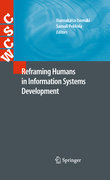
Reframing humans in information systems development
Isomäki, Hannakaisa
Pekkola, Samuli
Modern society has been transformed by the digital convergence towards a future where technologies embed themselves into the fabric of everyday life. This ongoing merging of social and technological infrastructures provides and necessitates new possibilities to renovate past notions, models and methods of information systems development that accommodates humans as actors within the infrastructure. This shift introduces new possibilities for information systems designers to fulfil more and more everyday functions, and to enhance their valueand worth to the user. Reframing Humans in Information Systems Development aims to reframe the phenomenon of human-centered development of information systems by connecting scientific constructs produced within the field of information systems which has recently provided a plethora of multidisciplinary user views, without explicitly defining clear constructs that serve the IS field in particular. IS researchers, practitioners and students would benefit from Reframing Humans in Information Systems Development as the book provides a comprehensive view to various human-centered development methods and approaches. The representatives of the fields of Human-Computer Interaction and Computer Supported Collaborative Work will also find this book an excellent resource. A theoretical handbook and collection of practical experiences, are included along with critical discussions of the utilization methods in ISD and their implications with some interconnecting commentary viewpoints. Provides a comprehensive overview of the perceptions of the end-users in different ISD methods and approaches. Reduces the current detached viewpoints of human-centred ISD by synthesizing and concentrating on the most essential viewpoints. Offers conceptualisations that serve as key constructs for theory development in information systems science and thus promotes grounds for multi-perspective theory development within the field of IS. INDICE: Preface.- 1. Introduction: Reframing Humans and Information Systems.- Part 1: Human Systems Analysis.- 2. On the Emergence of Techno-Religious Spaces: Implications for Design and End Users.- 3. Towards Lifeworld-Oriented Information Systems Development.- 4. Understanding the Business Client Systems Developer Relationship: A Power Perspective.- 5. A Semiotic Analysis of Interactions between End Users and Information Systems.- 6. Information Systems Development as an Intellectual Process: Designers’ Perceptions of Users.- Part 2: Methodology.- 7. Participatory Design in Information Systems Development.- 8. Reflecting, Tinkering, and Tailoring: Implications for Theories of InformationSystem Design.- 9. Evolutionary Application Development: Tools to Make Tools and Boundary Crossing.- 10. Design Science Research for User-Centeredness.- 11. “20 years a-Growing”: Revisiting From Human Factors to Human Actors.- Part 3: Practice.- 12. Three Levels of Failure: Analysing a Workflow Management System.- 13. When and How Do We Become a “User”?.- 14. Use of Mobile IS: New Requirements for the IS Development Process.- 15. Reframing Online Shopping throughInnovative and Organic User-Oriented Design.- 16. Stakeholder Involvement andTeam Working in Systems Development Practice.- 17. Epilogue.
- ISBN: 978-1-84996-346-6
- Editorial: Springer
- Encuadernacion: Cartoné
- Páginas: 300
- Fecha Publicación: 29/11/2010
- Nº Volúmenes: 1
- Idioma: Inglés
